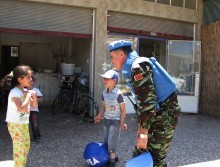The news coming out of Syria was schizophrenic this week. On the one hand, the United Nations advance observer team was making a positive impact despite their small numbers. On the other hand, dozens were being killed as the Syrian government continued to brutalize its own people. The way those dichotomies harmonized offers hope for the future—and a sober warning.
The spokesperson for Kofi Annan, the UN’s envoy to Syria, gave some good news on Monday regarding the handful of UN monitors there to observe a collapsing—if not already defunct—ceasefire. Ahmad Fawzi said to The Mideast Update that when the observers are in an area, “the guns usually fall silent and the crowds magically appear by their side and surround them and say, ‘Please stay, because when you’re here the violence stops.’”
But that positive occurrence appears to have been severely limited to wherever the observers were physically present at the time. On Tuesday, a US State Department Official said that based on sources inside Syria, at least 80 were killed in the country on Monday. He told The Mideast Update at least another 17 were killed on Tuesday, while on both days there were reports of “powerful explosions and intense gunfire” in the city of Homs.
Said the US official, “Opposition activists inside Syria say the regime’s brutal campaign continues unabated.”
On Tuesday, United States Ambassador to the UN Susan Rice explained how the observers are bringing peace even as the death toll rises, citing a briefing on the Syria situation from Annan to the UN Security Council.
Said Rice in comments released by her office, “Mr. Annan expressed his concerns at reports that attacks have resumed in locations directly following the departure of members of the observer team, calling them, and I quote, ‘unacceptable and reprehensible, if true.’”
And while the Syrian government has made multiple commitments and claims of good faith, Rice quoted Annan as saying, “The only promises that count are the promises that are kept.”
The diversity of reports—that the observers are helping but the violence continues elsewhere—place urgent importance on the expanded UN Supervision Mission to Syria (UNSMIS). Up to 300 unarmed military observers have been approved, and if the Syrian regime is willing to respect their presence and grant them access, there is hope the larger number of monitors will result in a more widespread and consistent ceasefire. Rice, citing a UN official, said 100 observers are hoped to be in the country “within a month.”
Rice, in her comments to the press on Tuesday, noted that “the problem is, obviously there’re not sufficient observers deployed at present” to leave in all places they might visit, where once they leave, “if the pattern holds,” there is “an intensification of violence.”
In other words, they can’t be everywhere at the same time—especially with less than a dozen observers in the country currently.
“Hence, the Council’s very unanimous and strong view, that having made the decision to deploy these monitors, let’s get them out as swiftly as possible,” said Rice.
In light of the impact of the observers, if there was ever a time when packing bags and preparing transportation could hold hundreds of lives in the balance, it’s now.
However, the speed of observer deployment is just one factor in trying to end the 13-month vicious government crackdown on dissidents in Syria. Another issue is the repeatedly-mentioned US concern that the Syrian regime allow the monitors to do their jobs unimpeded.
And perhaps most importantly, its imperative that the Bashar al-Assad government finally meet its obligations under Annan’s six-point peace plan, which includes the withdraw of troops from population centers, access to humanitarian aid and the beginning of an inclusive political dialogue.
The sad news is that so far the Syrian regime has not appeared to be willing, interested or even intimidated into adequately fulfilling any of these demands on a permanent basis.
This is why the current time really is, as US Secretary of State Hillary Clinton put it, a “crucial turning point” for Syria. The US and its allies need to step up the pressure on the Assad regime and prepare the ground for potentially blistering sanctions—such as a blanket arms embargo and crippling financial sanctions—from the UN Security Council if the Assad regime fails to implement the Anann plan in the next month.
The monitor mission can be given some time—and if Russia and China are ever going to condemn and sanction Syria time will be needed—but it can’t be unending. In the meanwhile, the US should be feverishly pushing diplomacy with its contacts in Moscow and Beijing.
Furthermore, the Turks should make good on their threats to call a NATO meeting over the Syrian refugee and cross-border shooting situation. The specter of NATO involvement in Syria will doubtless cast a shadow from Damascus to the Kremlin. Hopefully, it will bring about the needed intensity from Russia so NATO won’t actually need to intervene.
The next five weeks are critical. China takes over the presidency of the Security Council in June and while the position holds little real power, it will allow them to paint the picture of Syria in their terms as the official Security Council voice to the media.
Public opinion counts, and the Chinese and Russian people will likely be even further convinced to do nothing after a month of Beijing’s claims of opposition terrorism and warnings against Western imperialism in the Middle East. As this week has shown, the picture in Syria is complex—so it can doubtless be manipulated to prove both sides.
But the only side who should count is that of the Syrian people, and their blood-curdling cries are begging for help. Now is the time to respond, before too little becomes too late.
(By Joshua Spurlock, www.themideastupdate.com, April 25, 2012)

